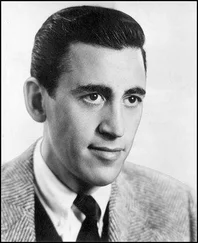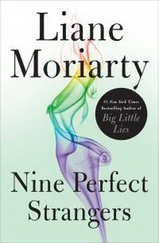J. Salinger - Nine Stories
Здесь есть возможность читать онлайн «J. Salinger - Nine Stories» весь текст электронной книги совершенно бесплатно (целиком полную версию без сокращений). В некоторых случаях можно слушать аудио, скачать через торрент в формате fb2 и присутствует краткое содержание. Жанр: Старинная литература, на английском языке. Описание произведения, (предисловие) а так же отзывы посетителей доступны на портале библиотеки ЛибКат.
- Название:Nine Stories
- Автор:
- Жанр:
- Год:неизвестен
- ISBN:нет данных
- Рейтинг книги:3 / 5. Голосов: 2
-
Избранное:Добавить в избранное
- Отзывы:
-
Ваша оценка:
- 60
- 1
- 2
- 3
- 4
- 5
Nine Stories: краткое содержание, описание и аннотация
Предлагаем к чтению аннотацию, описание, краткое содержание или предисловие (зависит от того, что написал сам автор книги «Nine Stories»). Если вы не нашли необходимую информацию о книге — напишите в комментариях, мы постараемся отыскать её.
Nine Stories — читать онлайн бесплатно полную книгу (весь текст) целиком
Ниже представлен текст книги, разбитый по страницам. Система сохранения места последней прочитанной страницы, позволяет с удобством читать онлайн бесплатно книгу «Nine Stories», без необходимости каждый раз заново искать на чём Вы остановились. Поставьте закладку, и сможете в любой момент перейти на страницу, на которой закончили чтение.
Интервал:
Закладка:
The pair of them, beside themselves with delight and coward's courage, now dared to look up at the Laughing Man. His head was bowed as in death, his chin resting on his bloody chest. Slowly, greedily, father and daughter came forward to inspect their spoils. Quite a surprise was in store for them. The Laughing Man, far from dead, was busy contracting his stomach muscles in a secret manner. As the Dufarges came into range, he suddenly raised his face, gave a terrible laugh, and neatly, even fastidiously, regurgitated all four bullets. The impact of this feat on the Dufarges was so acute that their hearts literally burst, and they dropped dead at the Laughing Man's feet. (If the installment was going to be a short one anyway, it could have ended there; the Comanches could have managed to rationalize the sudden death of the Dufarges. But it didn't end there.) Day after day, the Laughing Man continued to stand lashed to the tree with barbed wire, the Dufarges decomposing at his feet. Bleeding profusely and cut off from his supply of eagles' blood, he had never been closer to death. One day, however, in a hoarse but eloquent voice, he appealed for help to the animals of the forest. He summoned them to fetch Omba, the lovable dwarf. And they did. But it was a long trip back and forth across the Paris-Chinese border, and by the time Omba arrived on the scene with a medical kit and a fresh supply of eagles' blood, the Laughing Man was in a coma. Omba's very first act of mercy was to retrieve his master's mask, which had blown up against Mlle. Dufarge's vermin-infested torso. He placed it respectfully over the hideous features, then proceeded to dress the wounds.
When the Laughing Man's small eyes finally opened, Omba eagerly raised the vial of eagles' blood up to the mask. But the Laughing Man didn't drink from it. Instead, he weakly pronounced his beloved Black Wing's name. Omba bowed his own slightly distorted head and revealed to his master that the Dufarges had killed Black Wing. A peculiar and heart-rending gasp of final sorrow came from the Laughing Man. He reached out wanly for the vial of eagles' blood and crushed it in his hand. What little blood he had left trickled thinly down his wrist. He ordered Omba to look away, and, sobbing, Omba obeyed him. The Laughing Man's last act, before turning his face to the bloodstained ground, was to pull off his mask.
The story ended there, of course. (Never to be revived.) The Chief started up the bus. Across the aisle from me, Billy Walsh, who was the youngest of all the Comanches, burst into tears. None of us told him to shut up. As for me, I remember my knees were shaking.
A few minutes later, when I stepped out of the Chief's bus, the first thing I chanced to see was a piece of red tissue paper flapping in the wind against the base of a lamppost. It looked like someone's poppy-petal mask. I arrived home with my teeth chattering uncontrollably and was told to go right straight to bed.
------------------
Down at the Dinghy
------------------
IT was a little after four o'clock on an Indian Summer afternoon. Some fifteen or twenty times since noon, Sandra, the maid, had come away from the lake-front window in the kitchen with her mouth set tight. This time as she came away, she absently untied and re-tied her apron strings, taking up what little slack her enormous waistline allowed. Then she went back to the enamel table and lowered her freshly uniformed body into the seat opposite Mrs. Snell. Mrs. Snell having finished the cleaning and ironing was having her customary cup of tea before walking down the road to the bus stop. Mrs. Snell had her hat on. It was the same interesting, black felt headpiece she had worn, not just all summer, but for the past three summers--through record heat waves, through change of life, over scores of ironing boards, over the helms of dozens of vacuum cleaners. The Hattie Carnegie label was still inside it, faded but (it might be said) unbowed.
"I'm not gonna worry about it," Sandra announced, for the fifth or sixth time, addressing herself as much as Mrs. Snell. "I made up my mind I'm not gonna worry about it. What for?"
"That's right," said Mrs. Snell. "I wouldn't. I really wouldn't.
Reach me my bag, dear."
A leather handbag, extremely worn, but with a label inside it as impressive as the one inside Mrs. Snell's hat, lay on the pantry. Sandra was able to reach it without standing up. She handed it across the table to Mrs. Snell, who opened it and took out a pack of mentholated cigarettes and a folder of Stork Club matches.
Mrs. Snell lit a cigarette, then brought her teacup to her lips, but immediately set it down in its saucer. "If this don't hurry up and cool off, I'm gonna miss my bus." She looked over at Sandra, who was staring, oppressedly, in the general direction of the copper sauce-pans lined against the wall. "Stop worryin' about it," Mrs. Snell ordered. "What good's it gonna do to worry about it? Either he tells her or he don't.
That's all. What good's worryin' gonna do?"
"I'm not worryin' about it," Sandra responded. "The last thing I'm gonna do is worry about it. Only, it drives ya loony, the way that kid goes pussyfootin' all around the house. Ya can't hear him, ya know. I mean nobody can hear him, ya know. Just the other day I was shellin'
beans--right at this here table--and I almost stepped on his hand. He was sittin' right under the table."
"Well. I wouldn't worry about it."
"I mean ya gotta weigh every word ya say around him," Sandra said.
"It drives ya loony."
"I still can't drink this," Mrs. Snell said. ". . . That's terrible.
When ya gotta weigh every word ya say and all."
"It drives ya loony! I mean it. Half the time I'm half loony." Sandra brushed some imaginary crumbs off her lap, and snorted. "A four-year-old kid!"
"He's kind of a good-lookin' kid," said Mrs. Snell. "Them big brown eyes and all."
Sandra snorted again. "He's gonna have a nose just like the father."
She raised her cup and drank from it without any difficulty. "I don't know what they wanna stay up here all October for," she said malcontentedly, lowering her cup. "I mean none of 'em even go anywheres near the water now. She don't go in, he don't go in, the kid don't go in. Nobody goes in now. They don't even take that crazy boat out no more. I don't know what they threw good money away on it for."
"I don't know how you can drink yours. I can't even drink mine."
Sandra stared rancorously at the opposite wall. "I'll be so gladda get backa the city. I'm not foolin'. I hate this crazy place." She gave Mrs. Snell a hostile glance. "It's all right for you, you live here all year round. You got your social life here and all. You don't care."
"I'm gonna drink this if it kills me," Mrs. Snell said, looking at the clock over the electric stove.
"What would you do if you were in my shoes?" Sandra asked abruptly.
"I mean what would you do? Tella truth."
This was the sort of question Mrs. Snell slipped into as if it were an ermine coat. She at once let go her teacup. "Well, in the first place," she said, "I wouldn't worry about it. What I'd do, I'd look around for another--"
"I'm not worried about it," Sandra interrupted.
"I know that, but what I'd do, I'd just get me--"
The swinging door opened from the dining room and Boo Boo Tannenbaum, the lady of the house, came into the kitchen. She was a small, almost hipless girl of twenty-five, with styleless, colorless, brittle hair pushed back behind her ears, which were very large. She was dressed in knee-length jeans, a black turtleneck pullover, and socks and loafers.
Her joke of a name aside, her general unprettiness aside, she was-in terms of permanently memorable, immoderately perceptive, small-area faces-a stunning and final girl. She went directly to the refrigerator and opened it. As she peered inside, with her legs apart and her hands on her knees, she whistled, unmelodically, through her teeth, keeping time with a little uninhibited, pendulum action of her rear end. Sandra and Mrs. Snell were silent. Mrs. Snell put out her cigarette, unhurriedly.
Читать дальшеИнтервал:
Закладка:
Похожие книги на «Nine Stories»
Представляем Вашему вниманию похожие книги на «Nine Stories» списком для выбора. Мы отобрали схожую по названию и смыслу литературу в надежде предоставить читателям больше вариантов отыскать новые, интересные, ещё непрочитанные произведения.
Обсуждение, отзывы о книге «Nine Stories» и просто собственные мнения читателей. Оставьте ваши комментарии, напишите, что Вы думаете о произведении, его смысле или главных героях. Укажите что конкретно понравилось, а что нет, и почему Вы так считаете.










